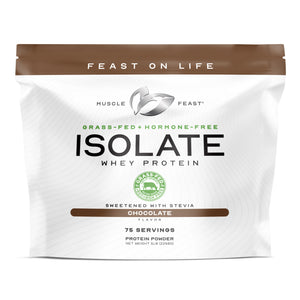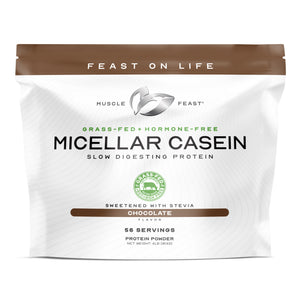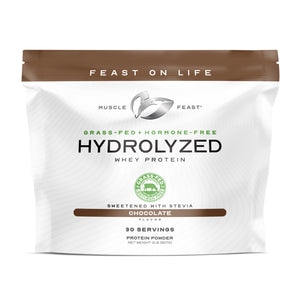Nutrition advice changes constantly, but one principle has held steady across decades of research: adequate protein is essential for fat loss, muscle retention, and metabolic health. Far from being a risk, higher protein intake helps people stay leaner, stronger, and more resilient as they age.
Across hundreds of trials and several meta-analyses, protein intakes between 1.2 and 1.8 grams per kilogram of body weight per day outperform the current RDA of 0.8 g/kg/day. At these levels, people lose more weight and keep it off, with no evidence of kidney or bone harm in healthy adults (Moon & Koh, 2020; Nunes et al., 2022).
1. Protein and Weight Loss: Mechanisms That Work
A 2020 review by Moon and Koh summarized more than 90 controlled trials examining how high-protein diets change body composition. Participants consuming higher protein consistently lost more total body weight and fat mass while maintaining or increasing lean mass.
This outcome follows directly from how the body processes protein:
- Higher thermogenesis: Protein burns about 20–30 percent of its calories during digestion, compared to 5–10 percent for carbohydrates and near zero for fat.
- Increased satiety: Protein stimulates hormones like GLP-1, CCK, and PYY while suppressing ghrelin, naturally curbing appetite.
- Metabolic protection: By preserving lean tissue, higher-protein diets help maintain resting metabolic rate during calorie restriction and prevent the metabolic slowdown typical of low-protein diets.
In multiple long-term trials, protein-rich diets improved waist circumference, BMI, and blood pressure. Even without calorie restriction, participants tended to eat less because they felt fuller longer.
The review also found no evidence of bone or kidney harm in healthy adults consuming up to about 2.0 g/kg/day, reinforcing that moderate to high protein intake is safe and beneficial for body composition and metabolic health (Moon & Koh, 2020).
2. Testing the Limits of Protein Intake
To see how far that safety margin extends, Antonio et al. (2016) conducted a crossover trial in trained men who consumed up to 6.6 g/kg/day of protein roughly six times the RDA for eight weeks per phase. Despite eating about 400 more calories per day, participants did not gain fat; nine of eleven actually lost fat mass. There were no negative changes in kidney, liver, or metabolic markers, and blood lipids and insulin remained stable.
Although small and short-term, this trial demonstrates that in healthy, resistance-trained men, the body handles protein calories differently from carbohydrate or fat calories. Excess protein is metabolically expensive; more is burned as heat or used to maintain muscle rather than stored as fat.
3. Long-Term Weight Management: The Protein Spread Effect
In real-world weight loss, the key is not how much protein a diet claims to contain it’s how much more protein a person eats compared to before.
This was demonstrated in the POUNDS Lost trial, a two-year study of over 800 adults (Bray et al., 2017). Regardless of whether participants followed low-fat or high-fat diets, those who increased their protein intake the most from baseline lost the most weight and kept it off. Those who met their protein goals lost an average of 8.3 kilograms at six months versus 4.8 kilograms for non-adherent participants.
Women consuming the highest-carbohydrate diets regained more weight between six and twenty-four months, suggesting that excess carbohydrate intake not protein is the primary driver of rebound weight gain.
This finding confirmed what the authors called the Protein Spread Hypothesis: the greater the increase in protein intake from baseline, the greater the weight-loss success over time.
4. Protein Quality and Metabolic Health
While Western discussions often warn against animal protein, global data tell a different story. In an 11-year cohort study of more than 4,000 adults, Hajihashemi et al. (2021) found that people who ate protein-rich foods animal or plant more frequently were 10 to 30 percent less likely to develop metabolic syndrome.
This included eggs, dairy, poultry, fish, and nuts. Processed meats showed no benefit, and legumes or soy were neutral after adjustment for other factors.
In a carbohydrate-dominant diet, as seen in the Iranian population studied, protein intake likely replaced refined starches and sugars, improving triglycerides, waist circumference, and blood pressure. The lesson is that both animal and plant proteins contribute to metabolic health when they displace empty carbohydrates.
5. Protein and Inflammation: Aging Without “Inflammaging”
Over seven years, researchers in the Framingham Heart Study followed 2,061 adults and measured changes in nine biomarkers of inflammation and oxidative stress (Hruby & Jacques, 2019).
Those with higher protein intake experienced smaller increases in inflammatory markers such as MCP-1 and IL-6. Substituting protein for carbohydrates or fats was associated with lower inflammation overall.
This aligns with the concept of “inflammaging” chronic, low-grade inflammation that accompanies aging and muscle loss. Higher habitual protein intake, particularly when it replaces refined carbohydrates, appears to help blunt this process and support healthier aging.
6. The Dose–Response: How Much Is Enough?
In 2022, Nunes and colleagues analyzed 74 randomized trials involving more than 2,600 adults to determine the optimal protein intake for lean mass and strength (Nunes et al., 2022).
Across these studies, gains in muscle and strength plateaued around 1.6 to 1.8 g/kg/day, confirming this as the most effective range for active adults. Lower intakes (around 1.2 g/kg/day) were sufficient for older adults, but higher levels yielded no additional benefit beyond 1.8 g/kg/day.
Importantly, none of the trials reported adverse effects on kidney, liver, or metabolic function even when protein intake exceeded 3 g/kg/day. These findings reinforce that the RDA of 0.8 g/kg/day is too low for maintaining muscle, metabolism, or functional longevity in healthy adults.
7. Bringing It All Together
Protein is not a bodybuilding supplement; it is an essential nutrient that supports muscle, metabolism, and healthy aging.
Across studies:
- Fat loss: Greater satiety and higher thermic cost lead to spontaneous calorie reduction.
- Muscle retention: Adequate amino acids preserve lean tissue and resting metabolism.
- Metabolic resilience: Protein helps stabilize blood glucose, lower triglycerides, and reduce inflammation.
- Safety: No adverse effects in healthy adults, even at several times the RDA.
With 40 percent of Americans obese and many losing muscle as they age, sufficient protein intake remains one of the few direct levers to improve both body composition and metabolic health.
Practical Takeaway
Aim for 1.2 to 1.8 grams of protein per kilogram of body weight daily. That is roughly a palm-sized serving at each meal such as eggs or yogurt at breakfast, meat or fish at lunch, and whey isolate or another lean source at dinner.
This article is for educational purposes and not medical advice. Individuals with kidney disease or other medical conditions should follow their clinician’s guidance.
- Conrad RN
References
Antonio, J., Ellerbroek, A., Silver, T., Vargas, L., & Peacock, C. (2016). The effects of a high protein diet on indices of health and body composition – a crossover trial in resistance-trained men. Journal of the International Society of Sports Nutrition, 13(3). https://doi.org/10.1186/s12970-016-0114-2
Bray, G. A., Ryan, D. H., Johnson, W., Champagne, C., Rood, J., Williamson, D. A., & Sacks, F. M. (2017). Markers of dietary protein intake are associated with successful weight loss in the POUNDS Lost trial. Clinical Obesity, 7(3), 166–175. https://doi.org/10.1111/cob.12188
Hajihashemi, P., Hassannejad, R., Haghighatdoost, F., Mohammadifard, N., et al. (2021). The long-term association of different dietary protein sources with metabolic syndrome. Scientific Reports, 11(19394). https://doi.org/10.1038/s41598-021-98688-0
Hruby, A., & Jacques, P. F. (2019). Dietary protein and changes in biomarkers of inflammation and oxidative stress in the Framingham Heart Study Offspring Cohort. Current Developments in Nutrition, 3(3), nzz019. https://doi.org/10.1093/cdn/nzz019
Moon, J., & Koh, G. (2020). Clinical evidence and mechanisms of high-protein diet-induced weight loss. Journal of Obesity & Metabolic Syndrome, 29(3), 166–173. https://doi.org/10.7570/jomes20041
Nunes, E. A., et al. (2022). Systematic review and meta-analysis of protein intake to support muscle mass and function in healthy adults. Journal of Cachexia, Sarcopenia and Muscle, 13(2), 795–810. https://doi.org/10.1002/jcsm.12922






Leave a Comment